Wildfire smoke poses a significant health risk, particularly for vulnerable populations such as farmworkers, given the nature of their jobs and their extended exposure to outdoor environments. This guide provides clinicians and community health workers (CHWs) with an overview of the effects of exposure to wildfire smoke, the reasons why farmworkers are more vulnerable to wildfire smoke, specific considerations for farmworkers, and practical strategies for preventive measures.
copy deeplink Wildfire Smoke as an Occupational Risk Factor | Clinician's Guide
Wildfire Smoke as an Occupational Risk Factor | Clinician's Guidecopy deeplink Poster: Three reasons to vaccinate against flu, COVID-19, and RSV
Poster: Three reasons to vaccinate against flu, COVID-19, and RSV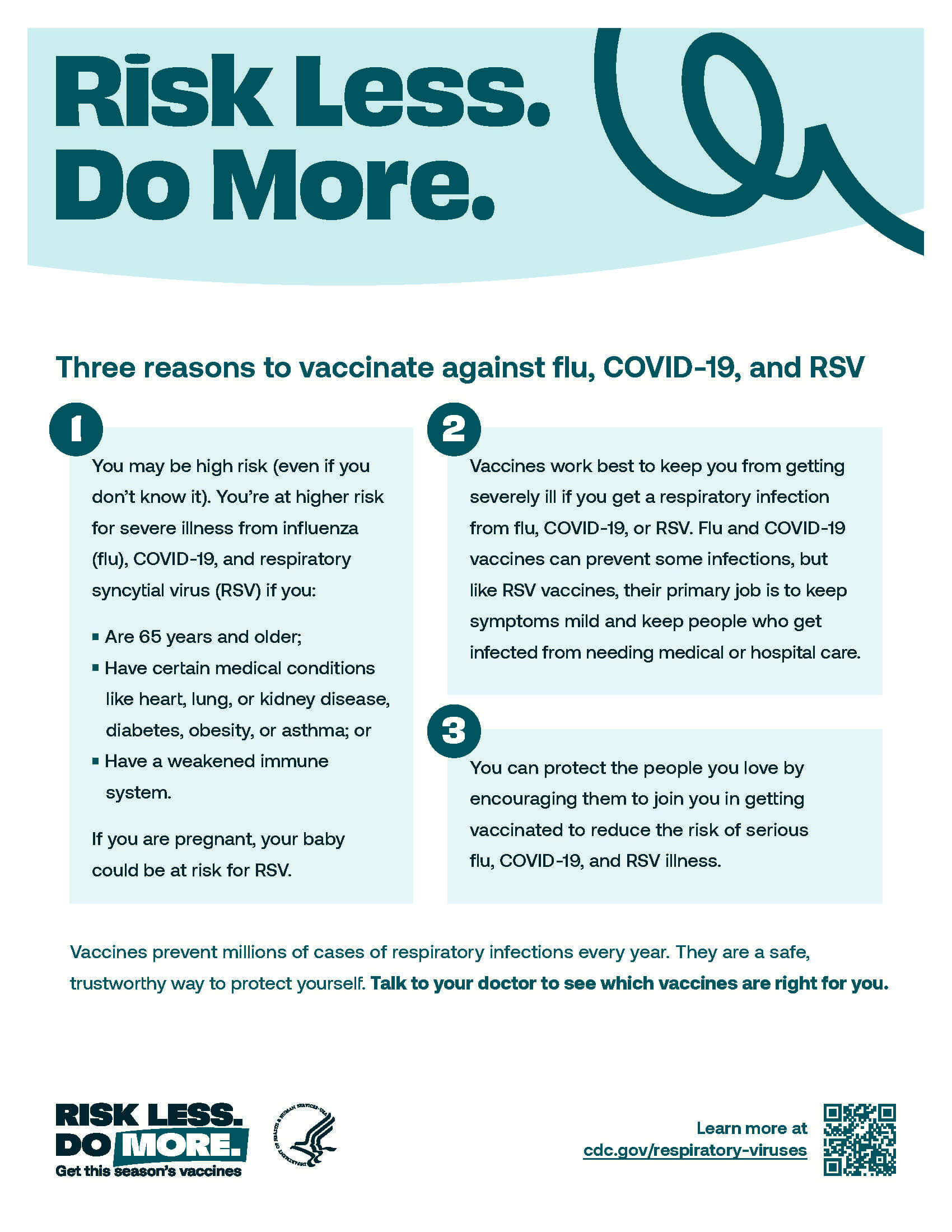
This poster aims to educate patients by offering 3 reasons to get vaccinated against the flu, COVID-19, and RSV. This resource can also be used as a patient handout. This resource was part of the U.S. Department of Health and Human Service’s Risk Less. Do More. campaign and last updated on January 17, 2025.
- Poster-Patient-Handout_Three-Reasons-Flu-Covid_RSV_English_10.28.24.pdf (1.06 MB)
- Poster-Patient-Handout_Three-Reasons-Flu-Covid_RSV_Spanish_10.28.24.pdf (974.64 KB)
- Poster-Patient-Handout_Three_Reasons_Flu_Covid_RSV_Vietnamese_10.24.28.pdf (948.61 KB)
- Poster-Patient-Handout_Three_Reasons_Flu_Covid_RSV_Traditional Chinese_11.5.24.pdf (987.41 KB)
- Poster-Patient-Handout_Three_Reasons_Flu_Covid_RSV_Chinese Simplified_10.28.24.pdf (943.37 KB)
- Poster-Patient-Handout_Three_Reasons_Flu_Covid_RSV_Korean_10.28.24.pdf (913.71 KB)
- Poster-Patient-Handout_Three_Reasons_Flu_Covid_RSV_Arabic_10.28.24.pdf (926.07 KB)
copy deeplink Poster: What is RSV and do you need an RSV vaccine?
Poster: What is RSV and do you need an RSV vaccine?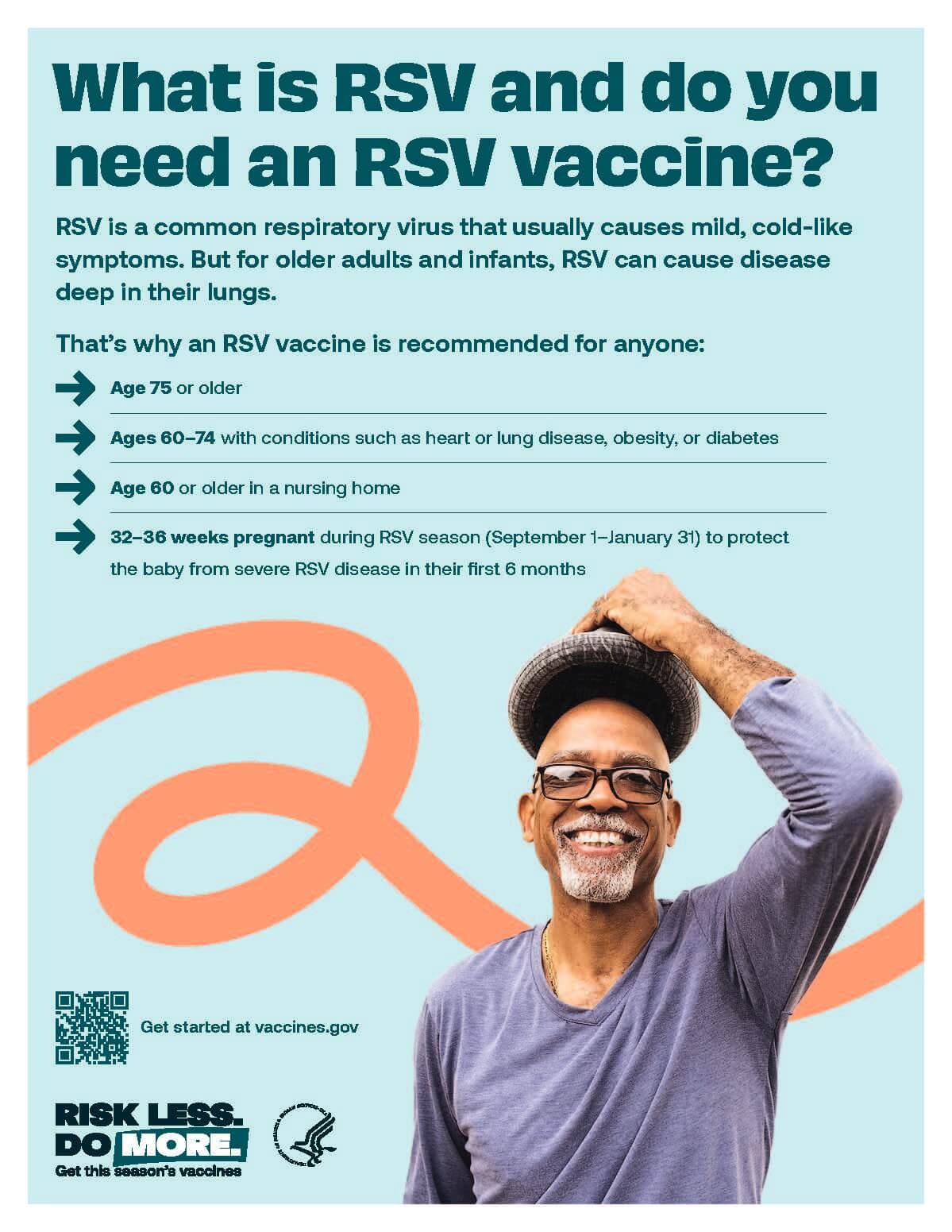
This poster aims to educate patients by highlighting important information about RSV and RSV vaccines. This resource was part of the U.S. Department of Health and Human Service’s Risk Less. Do More. campaign and last updated on January 17, 2025.
- Poster_RSV_English.pdf (1.33 MB)
- Poster_RSV_Spanish.pdf (1.35 MB)
copy deeplink Poster: Baby on Board? Get Vaccinated for Flu, COVID-19, and RSV
Poster: Baby on Board? Get Vaccinated for Flu, COVID-19, and RSV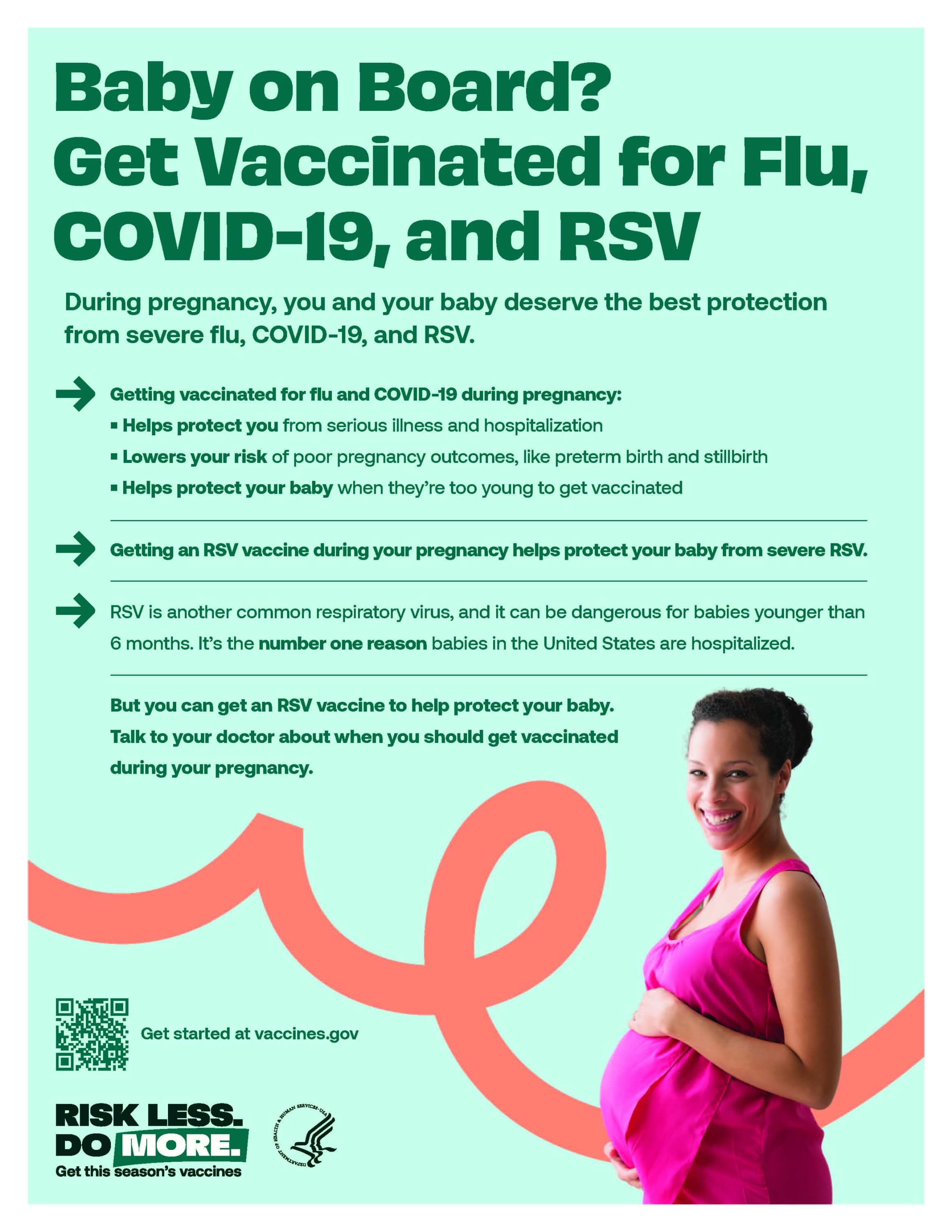
This poster aims to educate pregnant patients by highlighting important information about the flu, COVID-19, and RSV vaccines. This resource was part of the U.S. Department of Health and Human Service’s Risk Less. Do More. campaign and last updated on January 17, 2025.
copy deeplink Poster: Flu and COVID-19 - What You Should Know
Poster: Flu and COVID-19 - What You Should Know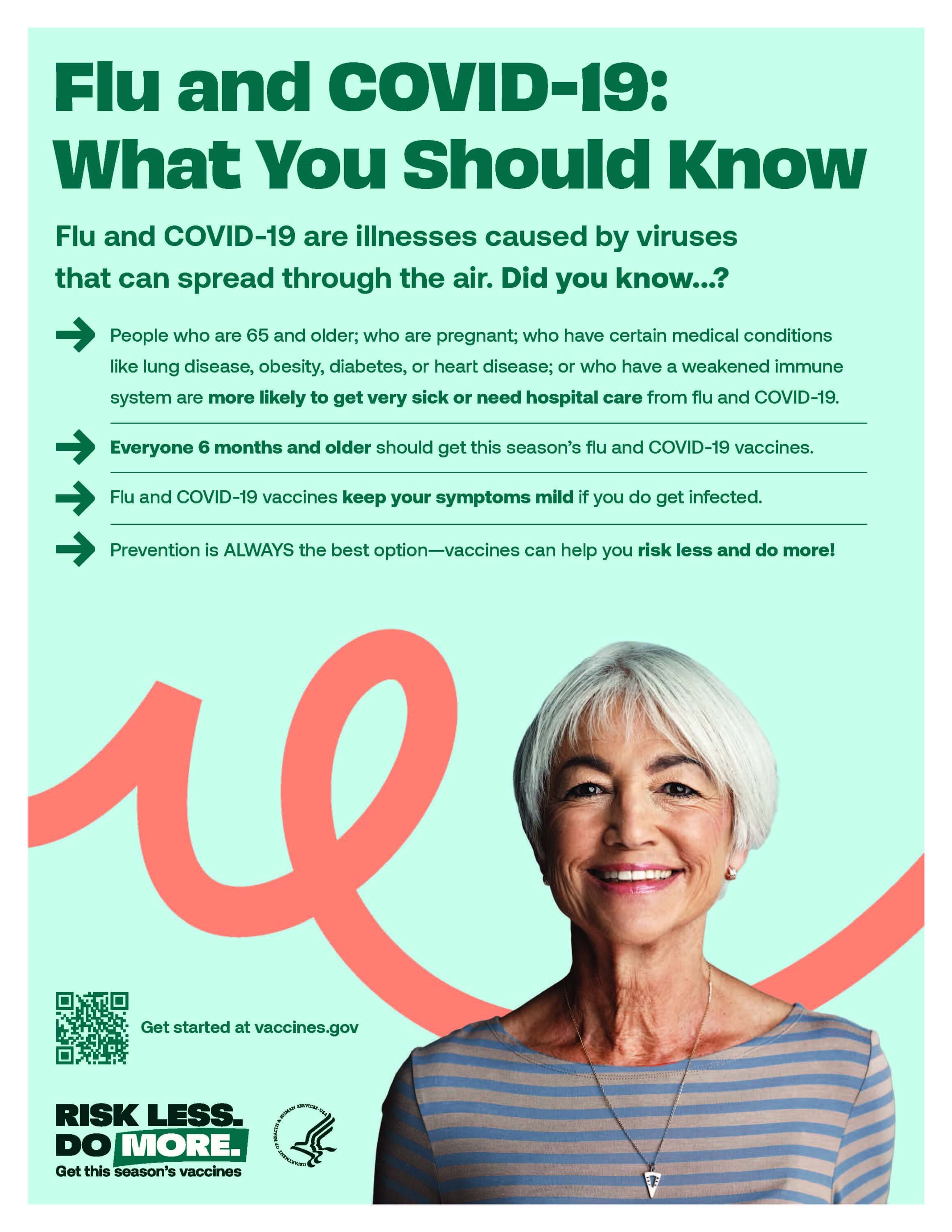
This poster aims to educate patients by highlighting important information about the flu and COVID-19 vaccines. This resource was part of the U.S. Department of Health and Human Service’s Risk Less. Do More. campaign and last updated on January 17, 2025.
copy deeplink Handout: What You Should Know About Flu, COVID-19, and RSV Vaccines
Handout: What You Should Know About Flu, COVID-19, and RSV Vaccines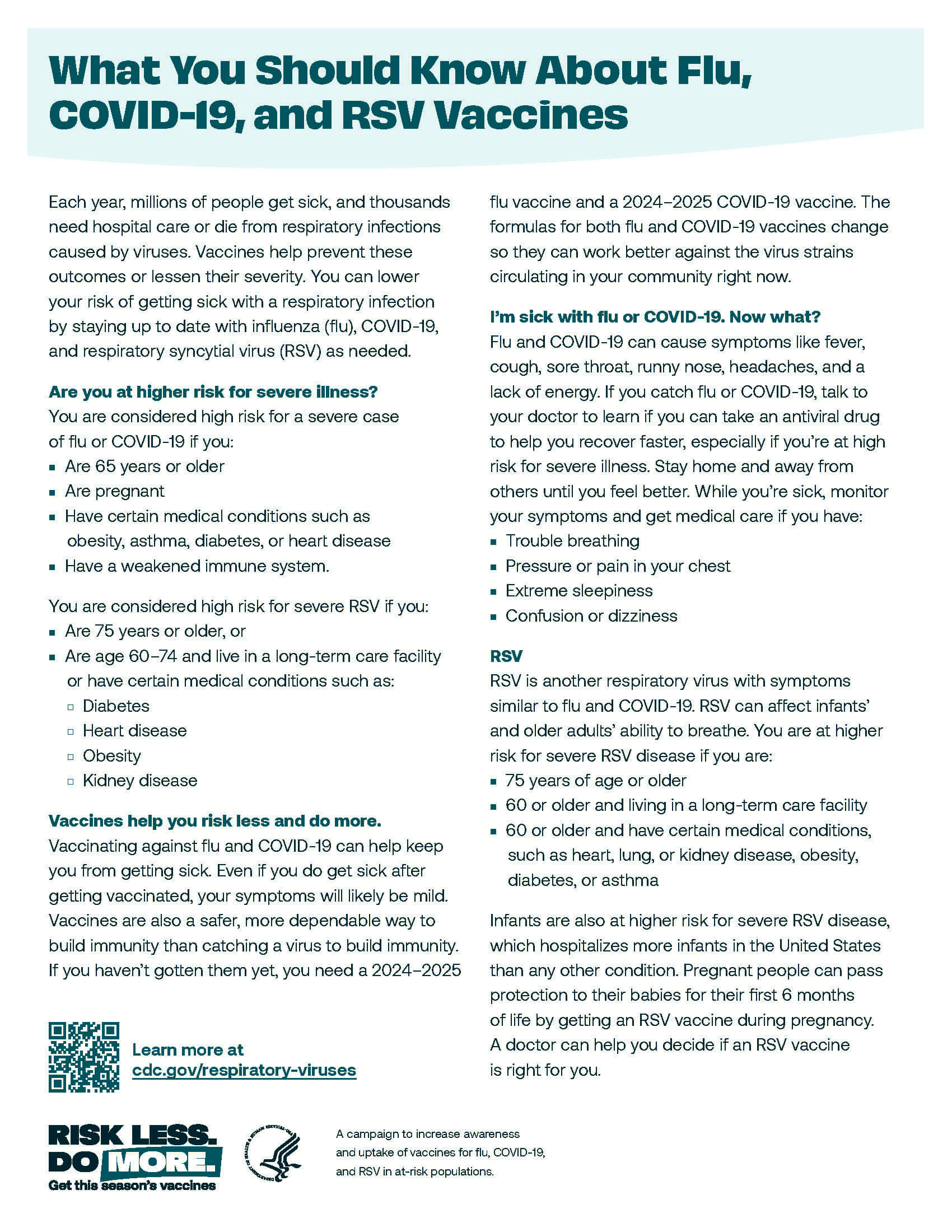
This detailed handout for patients which overviews information about flu, COVID-19, and RSV, risk, treatment, and vaccines. This resource was part of the U.S. Department of Health and Human Service’s Risk Less. Do More. campaign and last updated on January 17, 2025.
copy deeplink Fact Sheet: Flu, COVID-19, and RSV Vaccines: Common Questions and Concerns
Fact Sheet: Flu, COVID-19, and RSV Vaccines: Common Questions and Concerns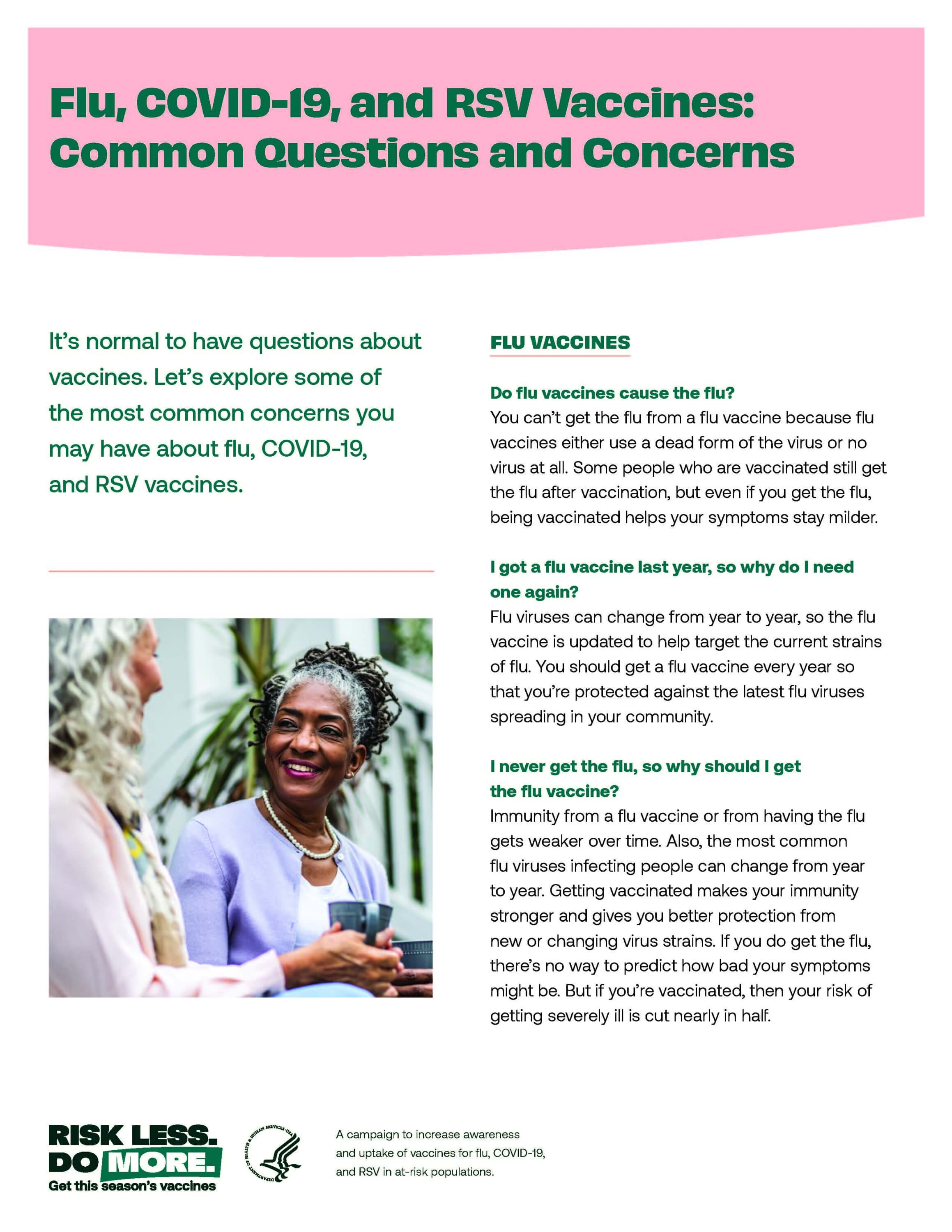
This handout for patients offers Q&A styled information about Flu, COVID-19, and RSV vaccines. This resource was part of the U.S. Department of Health and Human Service’s Risk Less. Do More. campaign and last updated on January 17, 2025.
- Patient-Fact_Sheet_Flu-Covid-RSV-Vaccine_Concerns_English_10.24.28.pdf (648.78 KB)
- Patient-Fact_Sheet_Flu-Covid-RSV-Vaccine_Concerns_Spanish_10.24.28.pdf (637 KB)
- Patient-Fact_Sheet_Flu-Covid-RSV-Vaccine_Concerns_Vietnamese_10.24.28.pdf (137.22 KB)
- Patient-Fact_Sheet_Flu-Covid-RSV-Vaccine_Concerns_Traditional Chinese_11.5.24.pdf (337.12 KB)
- Patient-Fact_Sheet_Flu-Covid-RSV-Vaccine_Concerns_Chinese Simplified_10.28.24.pdf (462.92 KB)
- Patient-Fact_Sheet_Flu-Covid-RSV-Vaccine_Concerns_Korean_10.28.24.pdf (209.18 KB)
- Patient-Fact_Sheet_Flu-Covid-RSV-Vaccine_Concerns_Arabic_10.28.24.pdf (155.73 KB)
copy deeplink Clinician Handout: Talking to Your Patients About Flu, COVID-19, and RSV Vaccines
Clinician Handout: Talking to Your Patients About Flu, COVID-19, and RSV Vaccines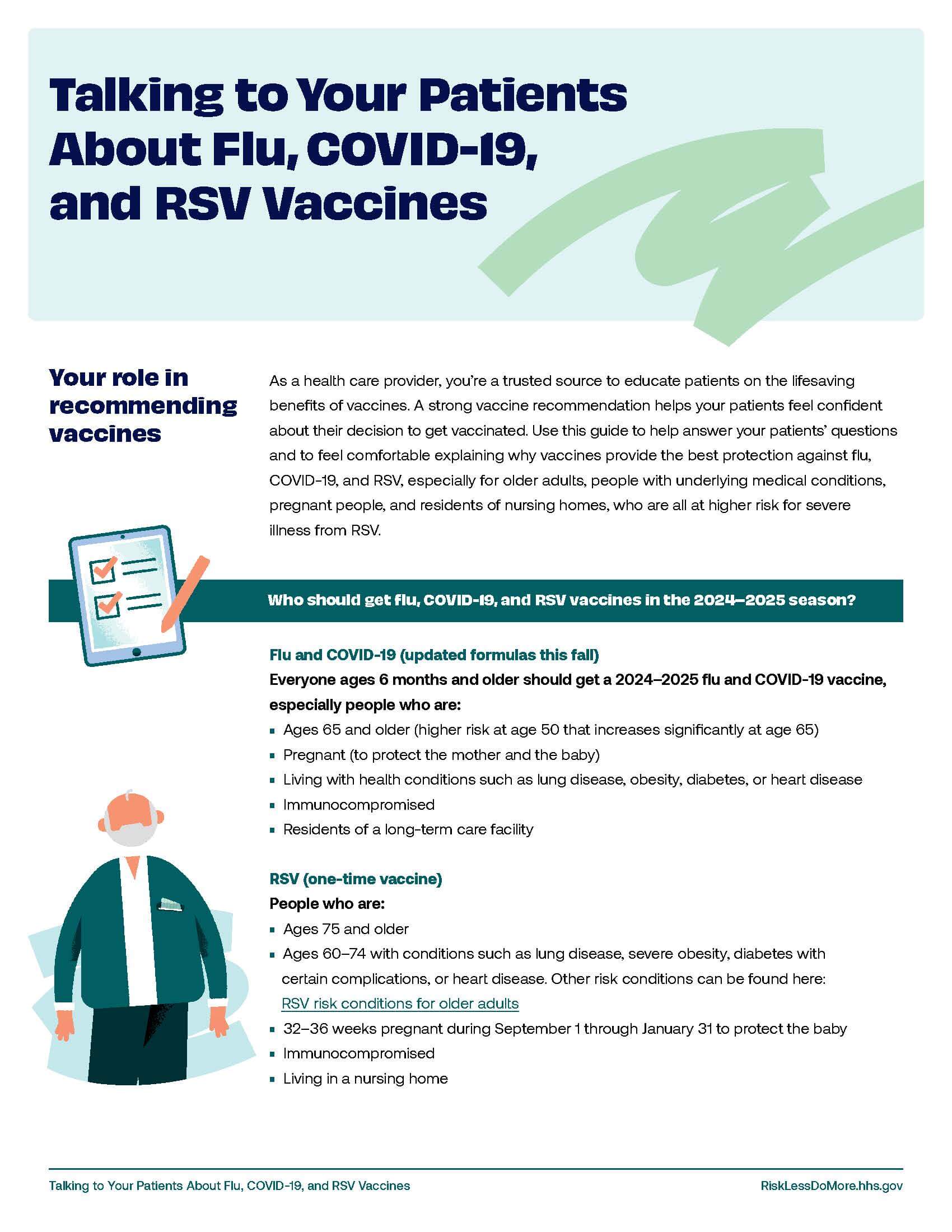
This is a resource for clinicians about their role in recommending vaccines to patients. This resource was part of the U.S. Department of Health and Human Service’s Risk Less. Do More. campaign and last updated on January 17, 2025. It includes information on:
- Vaccines
- How to start conversations with patients and patients who have expressed vaccine hesitancy
- Recommendations for how to answer common questions patients have about flu, COVID-19, and RSV vaccines
- How to start conversations with pregnant patients and pregnant patients who have expressed hesitancy
- Answering questions and concerns pregnant patients may have about vaccines
- A sample vaccine schedule.
copy deeplink Flu, COVID-19, and RSV Text Messages for Community Members
Flu, COVID-19, and RSV Text Messages for Community Members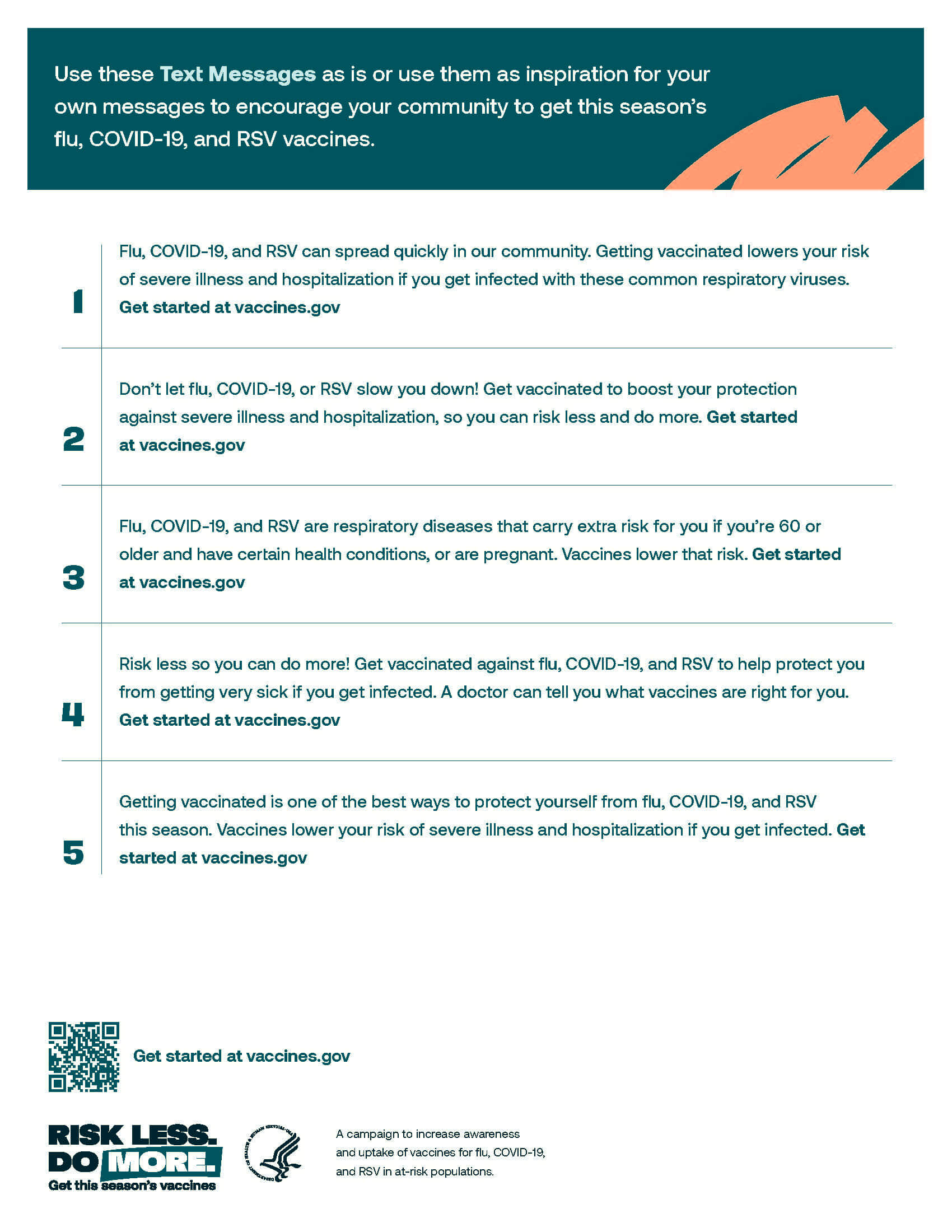
This resource offers sample text messages to send to community members about the Flu, COVID-19, and RSV vaccines. This resource was part of the U.S. Department of Health and Human Service’s Risk Less. Do More. campaign and last updated on January 17, 2025.
- Flu_COVID_RSV_Text_Messages_English.pdf (90.88 KB)
copy deeplink Clinician Handout: Addressing Common Concerns on Flu, COVID-19, and RSV Vaccines
Clinician Handout: Addressing Common Concerns on Flu, COVID-19, and RSV Vaccines
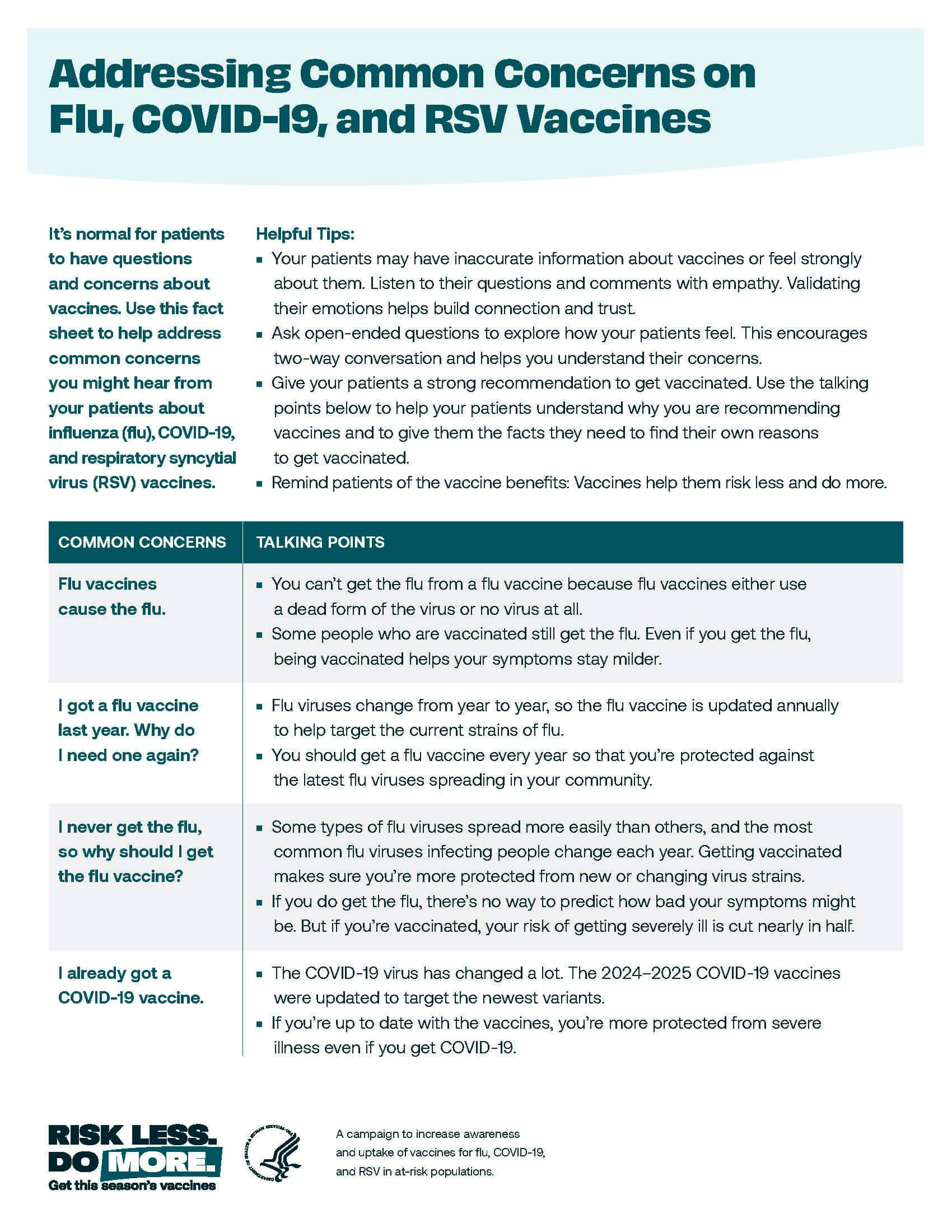 This handout for clinicians can be used as a tool to answer common questions patients have about Flu, COVID-19, and RSV vaccines. This resource was part of the U.S. Department of Health and Human Service’s Risk Less. Do More. campaign and last updated on January 17, 2025.
This handout for clinicians can be used as a tool to answer common questions patients have about Flu, COVID-19, and RSV vaccines. This resource was part of the U.S. Department of Health and Human Service’s Risk Less. Do More. campaign and last updated on January 17, 2025.
copy deeplink Fact Sheet: Older Adults and Flu, COVID-19, and RSV - How to Protect Yourself
Fact Sheet: Older Adults and Flu, COVID-19, and RSV - How to Protect Yourself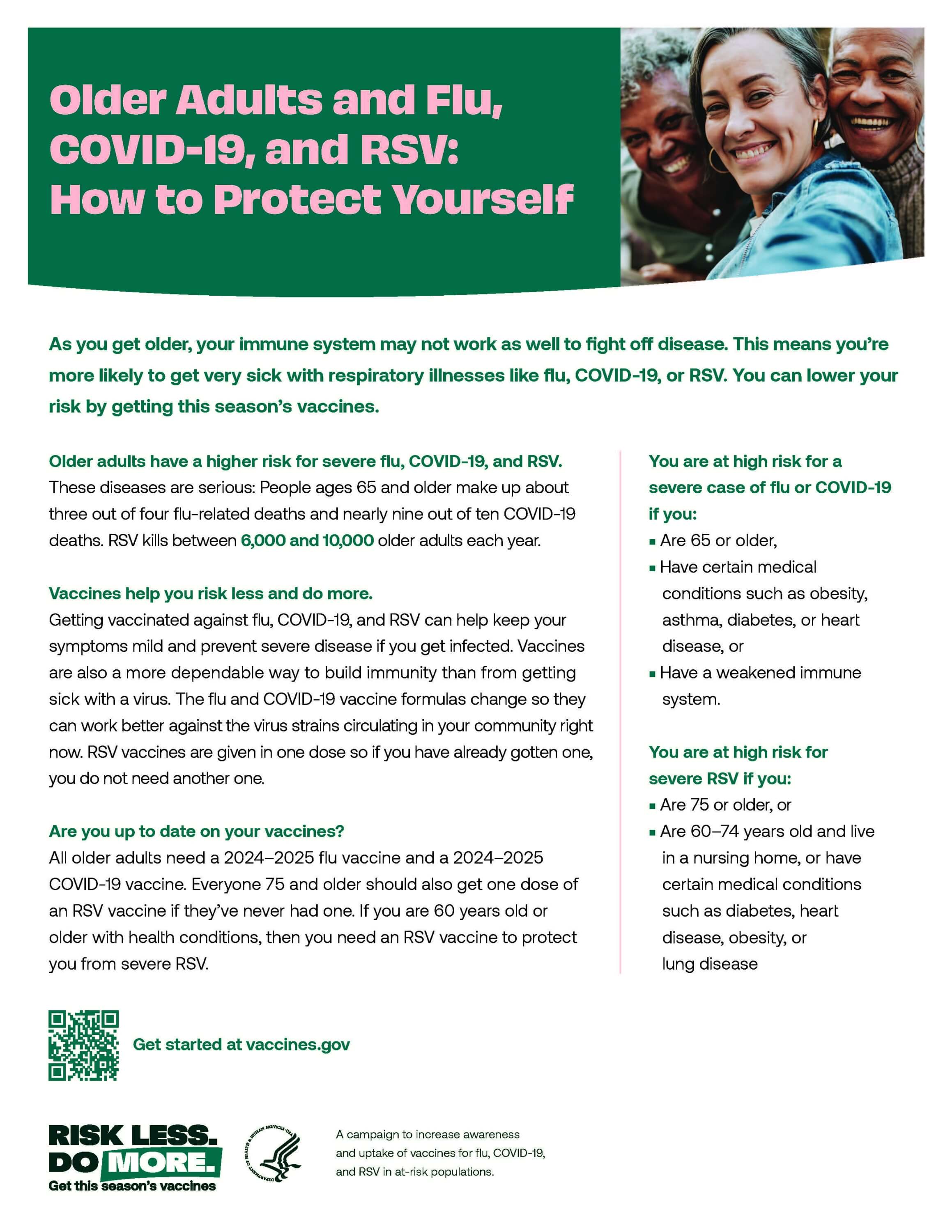
This handout is for older adult patients to educate them on their risks for contracting the flu, COVID-19, and RSV, and about getting vaccines to protect themselves against these illnesses. This resource was part of the U.S. Department of Health and Human Service’s Risk Less. Do More. campaign and last updated on January 17, 2025.
- Fact_Sheet_Older Adults-Flu-Covid-RSV_English_10.28.24.pdf (468.86 KB)
- Fact_Sheet_Older Adults-Flu-Covid-RSV_Spanish_10.28.24.pdf (370.32 KB)
- Fact_Sheet_Older_Adults-Flu-Covid-RSV_Vietnamese_10.24.28.pdf (120.72 KB)
- Fact_Sheet_Older_Adults-Flu-Covid-RSV_Traditional Chinese_11.5.24.pdf (295.52 KB)
- Fact_Sheet_Older_Adults-Flu-Covid-RSV_Chinese Simplified_10.28.24.pdf (323.04 KB)
- Fact_Sheet_Older_Adults-Flu-Covid-RSV_Korean_10.28.24.pdf (171.5 KB)
- Fact_Sheet_Older_Adults-Flu-Covid-RSV_Arabic_10.28.24.pdf (149.4 KB)
copy deeplink Flu, COVID-19, and RSV Vaccines E-Newsletter Blurb
Flu, COVID-19, and RSV Vaccines E-Newsletter Blurb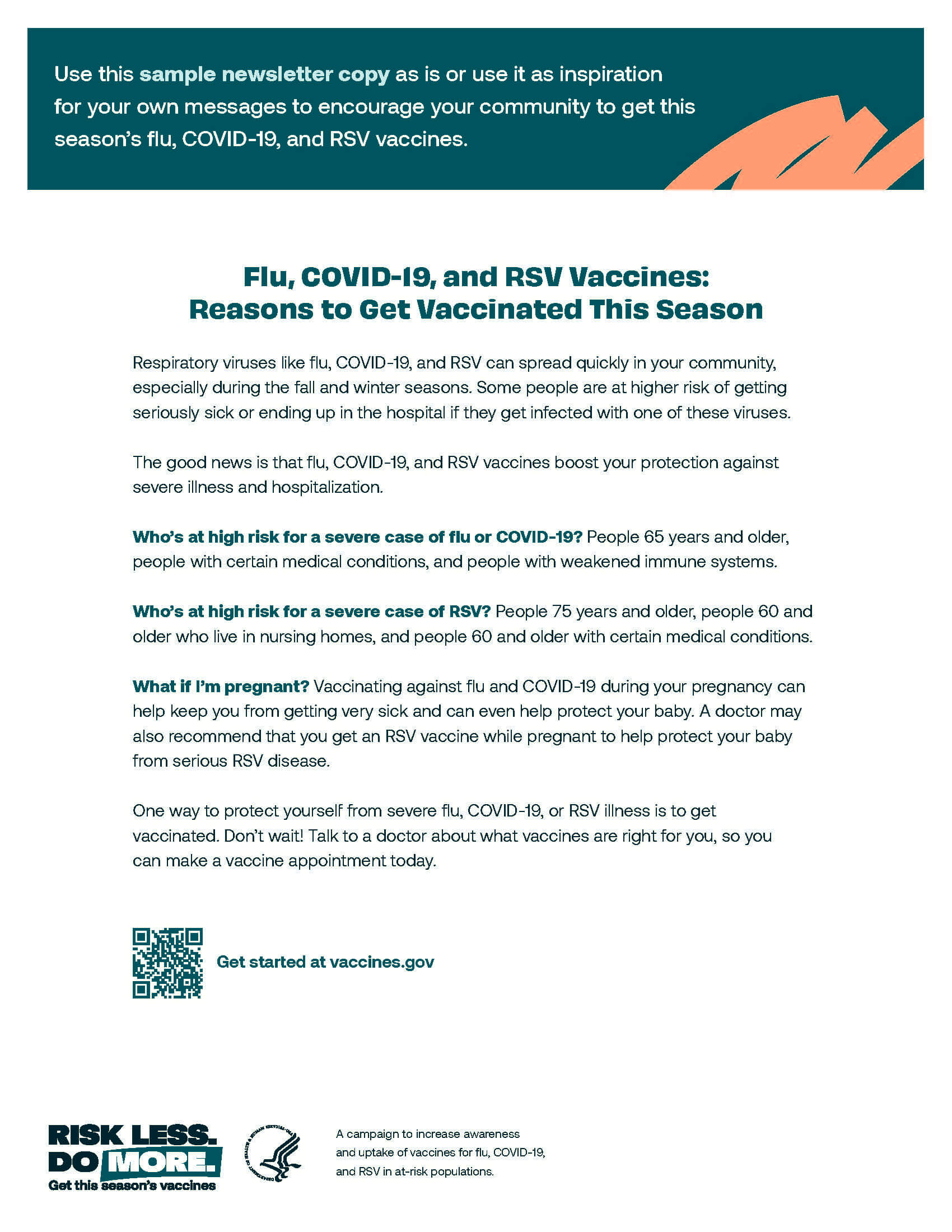
Use this sample E-newsletter to communicate to your audiences about reasons to get vaccinated against the Flu, COVID-19, and RSV. This resource was part of the U.S. Department of Health and Human Service’s Risk Less. Do More. campaign and last updated on January 17, 2025.
- E-Newsletter_Blurb_English.pdf (96.42 KB)
- E-Newsletter_Blurb_Spanish.pdf (101.24 KB)
copy deeplink How to Talk to a Child Worried About Deportation
How to Talk to a Child Worried About DeportationResources in English and Spanish from Florida State University's Center for Child Stress and Health on how to talk to a child about deportation and associated stress.
- CCSH_Deportation_EN.pdf (72.55 KB)
- CCSH_Deportation_SP.pdf (70.94 KB)
What many thought would be a period of electoral uncertainty is today a time of certainty. There will be many analyses of why the outcomes are what they were but there will be no definive answers today.
Today is a day to take care of yourself and the many communities of which you are apart. There will be differences among those you know, work with and care for. Greet everyone with kindness.
We know everyone is stressed; not everyone is stressed for the same reasons. These 11 practices can help you support yourself and others.
